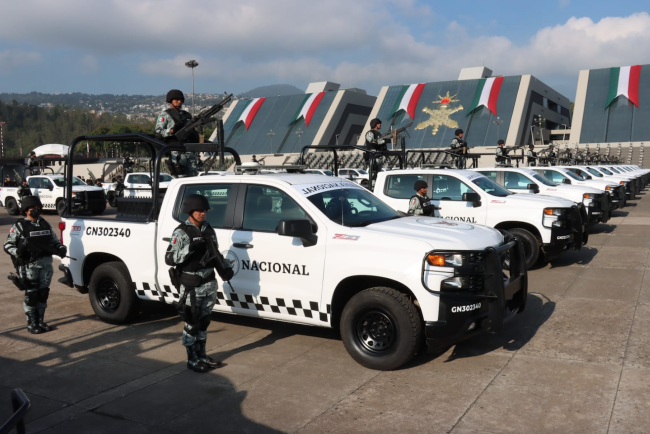
Leer este artículo en español.
On the afternoon of February 26, medical doctor Miguel Ángel Zavala Reyes was shot dead in his vehicle. Just five hours later, Armando Pérez Luna died from shots fired by two hitmen on a motorcycle.
The two victims had in common their intention to run for mayor of Maravatío, a town of 80,000 inhabitants in the state of Michoacán. Zavala Reyes had registered to seek the nomination of the center-left National Regeneration Movement (Morena) party, and Pérez Luna had done the same for the right-wing National Action Party (PAN).
On June 2, Mexicans will elect not only the president but also 500 members of Congress, 128 senators, and more than 2,000 local representatives. Just days before the vote, a total of 30 candidates have been murdered, 77 have reported threats against them, and 11 have been kidnapped.
Even before the electoral campaign period opened on November 21, 21 victims of political violence had already been recorded, most of them pre-candidates at the municipal level. As in past election cycles, this vote was expected to yet again be the most violent in the history of Mexico, a country in which journalists commonly set up Google alerts with the keywords “candidate” and “murdered” every time an election is called.
The case of Maravatío is not an isolated event. However, the elimination of candidates there from two opposing political forces makes it clear that the ruling party is not behind these attacks, as was common in the 20th century. Now we are dealing with an actor outside the party system: organized crime.
An Ineffective Military Strategy
This increase in violence as a tool of political influence on the part of criminal groups coincides with the largest territorial presence of the Army, the Navy, and the recently created National Guard—also composed of and commanded by the military—in recent Mexican history. This significantly expanded military presence began with the inauguration of Andrés Manuél López Obrador's presidential term in 2018, when he undertook a security strategy radically opposed to the military demobilization program he had promised during his campaign.

The government's military strategy has presented meager results, reducing the overall national homicide rate and slowing down—but not yet clearly reversing—the upward trend in murders. Why, then, are the assassinations of political candidates persistently increasing?
According to Victoria Unzueta Reyes, a researcher and congressional advisor on security and the Armed Forces, violence against candidates, particularly at the municipal level, is escalating “because the municipality is directly linked to territory.” “And in this sense,” she adds, “what we are seeing with each election is a rearrangement of political forces according to the [territorial] interests of organized crime.”
While partisan organizations mobilize through their electoral bases, and big business uses the economy as leverage to influence political decisions, the primary tool of criminal organizations is violence. They use violence both to make it clear that they do not “approve” of the participation of a certain candidate, and to warn others of their possible fate if they do not allow criminal groups to act as they please.
Under this logic, criminal organizations, whether local or associated with larger groups, use violence to impose authorities who allow them to continue their operations unimpeded, whether it be the production and transfer of illicit goods or the smuggling and trafficking of migrants. A review of the data presented by the organization Data Cívica in its interactive database “Votar entre Balas” shows that the highest number of attacks and aggressions are concentrated in towns and cities of the states with a high presence of local criminal groups, such as in Guanajuato and Guerrero, or with frequent confrontations between groups in conflict, as is the case in Jalisco and Michoacán. But attacks are prevalent in practically all states, including in Mexico City.
In the face of these actions aimed at achieving territorial control for economic purposes, the state's response has invariably been to deploy more military units to regain—or at least dispute—territorial control. The state does not, however, attack the financial structures or networks of corruption through which criminal groups sustain their operations.
Unzueta says this is an insufficient strategy that does not offer progress towards security. “What they have to do is attack all three elements,” says Unzueta, “so that [the state] can then say ‘I am really fighting organized crime.’ The only thing we are seeing right now is a dispute for territorial control, between the state and the criminal organizations.”
A Society that Lives in Fear
The violence that occurs in each electoral cycle has effects beyond the direct number of victims. For example, murders such as those of the two candidates for mayor of Maravatío, coupled with little or no response from the government to requests for protection by other candidates, led 38 people in the state of Michoacán to withdraw their candidacies for elected office because of the risks associated with not being “liked” by the leaders of local criminal groups.
There is a high rate of reluctance to participate, not only when it comes to candidacies but also in the execution of the electoral process itself. The National Electoral Institute (INE) reports having to replace more than 578,000 people who had committed to be polling officials but regretted the decision after having accepted one of the nine positions required at each polling station. This left the INE without approximately one third of the volunteers needed to guarantee satisfactory elections, requiring the institute to approve an emergency measure to re-allocate staff.
The INE not only had to use second and third-tier options to fill citizen positions, but also had to cover with its own personnel a shortage of 4,000 electoral assistant trainers. In addition to preparing the poll workers, these temporary workers perform essential functions on election day such as supervising voting activities, sending results for the Preliminary Results Electoral Program (PREP), and participating in tallies and recounts.
On the voters' side, Data Cívica—the organization that also tracks threats, assassinations, aggressions, and kidnappings of political actors during the electoral period—calculates that with each public act of political violence, local voting intention drops by up to 3 percent. In Mexico, elections normally attract between 55 and 60 percent of the electoral roll, with a record in 2018, when 63 percent of voters showed up to the polls. If the dynamics described by Data Cívica are accurate, a lower voter turnout in rural communities would reinforce the weight of votes from large urban centers.
The decreased participation of both citizen officials and voters in the elections is accompanied by a lack of confidence in the democratic process. The consequences for the general population are significant. At the state and federal level, orders come from partisan organizations that are unconcerned about local interests. At the local level, the candidate who is left (alive) will receive orders from the respective criminal group in that area, regardless of the political force he or she represents.
The leading candidates, Claudia Sheinbaum of the governing Morena party and Xóchitl Gálvez of the conservative PAN, have promised to continue the strategy of military control of the territory. Gálvez, for her part, promises to introduce civilian control over the National Guard while Sheinbaum believes that the Army should remain in command of a force oriented toward territorial control and not the prevention and investigation of crimes—capabilities the military lacks.
In its analysis of the candidates’ campaign proposals, Insight Crime concludes that none of the security proposals put forward by the leading candidates adequately respond to the complexity and entrenchment of criminal networks. Sheinbaum proposes in general terms to increase cooperation between investigative agencies to control the finances of criminal groups, but without giving further details. Neither candidate offers anything substantial in terms of combating government corruption at all levels with respect to organized crime.
On June 2, in Mexico's municipalities, victims of electoral violence will vote—or not—with fear and little confidence that the outcome of the elections will have any real effect on their lives. As the security researcher Unzueta warns: “A society that lives in fear cannot be democratic.”
Pablo Pérez García is a Mexican journalist with a focus on human rights based in Mexico City and Monterrey. He is a contributor to international outlets such as Al Jazeera, the BBC, and DW specializing in migration, disappearance, and social movements.

